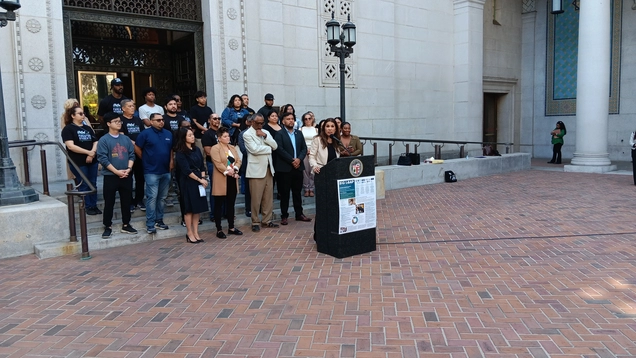
L.A. City Councilmembers Curren Price, Marqueece Harris-Dawson, Hugo Soto-Martinez introduce motion for new GI program
The City of Los Angeles’ Community Investment for Families Department unveiled a new report on July 30 that showed overwhelmingly positive results for participants of the Basic Income Guaranteed: Los Angeles Economic Assistance Pilot (BIG:LEAP) program, paving the way for a motion to create a new Guaranteed Income Pilot program for vulnerable Angelenos.
CIFD joined Los Angeles City Councilman Curren Price and Hugo Soto-Martinez for a press conference at City Hall to unveil the report findings for the first time with the public. The report demonstrated that participants of the 12-month BIG:LEAP program who received $1000 monthly cash payments experienced increased financial well-being, food security, greater sense of community, reduced intimate partner violence, and improved feelings of safety in their neighborhoods.
BIG:LEAP served 3,200 households living in deep poverty within the City of Los Angeles, providing them unrestricted monthly funds from January 2022 to March 2023. Implemented by the Community Investment for Families Department (CIFD) and supported by the city’s general fund with additional investments from several Councilmembers, BIG:LEAP serves as an example of a government-led direct cash program executed at a large scale with public resources and infrastructure.
Following the release of data at the press event, Councilmembers Price, Marqueece Harris-Dawson, and Soto-Martinez introduced a motion instructing CIFD to provide recommendations for expanding and creating a new $4 to $5 million Guaranteed Income program, specifically targeting individuals experiencing Intimate Partner Violence (IPV) and Transitional Age Youth (TAY).
“Through this program, we witnessed transformation beyond measure,” said Councilmember Price, who proposed the pilot in 2021. “BIG:LEAP didn't just help Angelenos address health issues, school expenses, childcare, or emergency needs; it empowered participants to start businesses, move into their own homes, and reclaim hope from despair. The undeniable impact of programs like BIG:LEAP speaks volumes—it has the power to rewrite destinies and is vital for a brighter future.”
The research was led by the Center for Guaranteed Income Research (CGIR) at the University of Pennsylvania’s School of Social Policy & Practice (SP2), in partnership with the University of California, Los Angeles (UCLA) Fielding School of Public Health.
It was part of a series of CGIR publications collectively named The American Guaranteed Income Studies, and found that despite extreme financial pressures and profound effects of the COVID-19 pandemic, recipients benefited from GI in several ways over the duration of the program:
- Improved safety and autonomy — GI recipients reported reduced severity and frequency of intimate partner violence (IPV), with recipients using GI to prevent and exit circumstances of IPV.
- Strengthened sense of community — GI recipients were considerably more likely to report reduced fear of neighborhood violence and increased positive interactions with neighbors.
- Improved financial well-being — GI recipients demonstrated a significantly increased ability to cover a $400 emergency compared to the control group.
- Enhanced food security — GI recipients showed a notable decrease in food insecurity and an increase in health-promoting behaviors.
- Increased enrichment for children — Compared to those in the control group, parents receiving GI were significantly more likely to maintain their children’s extracurricular activities and reported more time for parenting.
Council President Pro-tem Harris-Dawson,who also made a significant investment in the pilot shared that “the BIG:LEAP program offers significant change for some and life-altering benefits for others. The data underscores its effectiveness and success in improving health and wellbeing, and stability for all who participated.”
BIG:LEAP participants reported that the program helped them invest in their futures by paying for school tuition, starting small businesses, and paying for new clothes and shoes for their children.
Councilmember Soto-Martinez, Chair of the City’s Civil Rights, Equity, Immigration, and Disability Committee also joined the press conference and co-signed the motion introduced by Councilman Price. “The results of this study are clear – Guaranteed Basic Income works,” said Councilmember Hugo Soto-Martínez. “When we take bold action, we can improve our community’s financial well-being, food security, safety, and so much more.”
“We know that too many families in Los Angeles are one missed paycheck or one health crisis away from losing their livelihood and the roof over their head,” said Councilmember Nithya Raman. “The BIG:LEAP pilot program proved beyond a doubt that with a guaranteed source of income, families are significantly more likely to stay housed, stay employed, and stay safe. We now have the opportunity to scale-up this transformative program, providing the support families and communities need – and adding one more tool to our toolbox in stopping the inflow into homelessness.”
“We must continue to implement creative solutions to the challenges we face and I look forward to continuing that work with locked arms,” City of Los Angeles Mayor Karen Bass said, in response to the report. “The City of Los Angeles is working urgently to provide Angelenos with economic opportunities and resources in our efforts to alleviate poverty throughout L.A. These are encouraging results and I'm looking forward to expanding this program in more stable economic times.”
CIFD will apply the lessons learned and recommendations from the research study and report back to the City Council on a proposed framework for a new pilot.
“We are excited by the findings of the report as it confirms what we already believed - that families experiencing poverty should be trusted to spend money as they see fit and can improve their quality of life when we invest resources into them,” CIFD General Manager Abigail R. Marquez said.
“But the impact of BIG:LEAP goes well beyond participants; this moment could serve as a shift in how we support families and communities.”